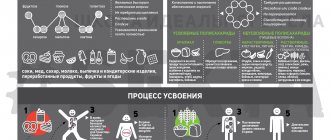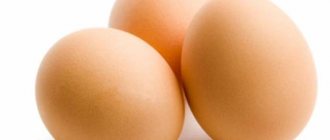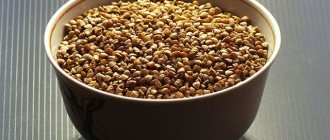How much protein should you eat per day? While the focus in recent decades has been on fats and carbohydrates, today more and more research shows that getting enough protein in your diet is very important. They even remembered that the word “protein” comes from the Greek protos, which means “first”.
Apart from water, bones and fat, the human body consists of protein. The most protein is in the muscles, but that’s not all: the heart, blood vessels, ligaments, tendons, skin and hair are also protein. And also hormones, enzymes, cells of the immune system. And all this must be updated. Different body tissues renew themselves at different rates. Plasma proteins - within several hours. Muscle proteins - in a few days. Renewal of connective tissue can take months and even years.
Muscle growth and maintenance depend on the protein in your diet. Recovery from illness and stress also depends on adequate amounts of protein. The effectiveness of a diet for weight loss also requires a lot of protein in food. So protein is important for both health and figure. But how much is needed? There is no clear answer. The amount of protein depends on a person’s physical activity, health status, age and nutrition.
The RDA (US National Dietary Guidelines for Health) recommends 0.8 grams per kilogram of body weight. This is the minimum for people who do not exercise or diet (). More recent studies say that the same non-athlete needs more protein - 1-1.2 grams per kilogram of body weight.
The new norm has not yet become official, although since the publication of the current protein rda, many studies have shown some benefits from increasing protein in food: maintaining muscle mass even in old age (prevention of osteoporosis), improving nutritional quality, weight control and improving body composition.
In 2013, the second The Protein Summit took place (the first was held in 2007), the results of which were published in the American Journal of Clinical Nutrition. The purpose of the summit is to discuss the role of protein in human health and explore the misconception that Americans eat too much protein, above RDA guidelines. More than 60 nutrition researchers, health experts and nutritionists attended the summit.
Based on research presented at the summit, increasing your protein intake by twice the recommended amount is not only safe, but also beneficial. This works out to be approximately 15%-35% protein as a share of total daily calories, but may be higher or lower than this range depending on age, gender and activity level.
The American College of Sports Medicine ACSM recommends consuming 1.5-2 grams of protein per kg of body weight per day for strength training, and 1.2-1.4 grams per day per kg of body weight for endurance training. And he calls 2 grams the extreme limit, above which protein is not harmful, but no longer has additional benefits.
The National Strength and Conditioning Association NSCA also recommends 1.5-2 grams per kilogram of body weight per day for exercisers.
Some studies suggest that protein intake in athletes can be increased to 3 g/kg per day, this is not harmful and may have additional benefits - although not dramatic.
The International Society of Sports Nutrition recommends 1.4-2.0 g/kg body weight for physically active people, and says that this is not only safe, but also beneficial for the body's adaptation to stress (,).
The American Dietetic Association also supports high protein intakes for active people () in the range of 1.2-1.7 g/kg body weight.
Lyle MacDonald in his book The Protein book, based on various studies of protein norms for athletes, gives the following figures.
What are proteins
Proteins - or, scientifically, proteins (Greek "proton" - first) - high-molecular organic substances consisting of amino acids. Roughly speaking, the concepts of “proteins”, “proteins”, “amino acids”, BCAA, “isolates” are all one and the same thing - proteins and their components.
Proteins are part of all cells in our body. In most cells, protein makes up 50% of their dry mass. Our muscles, organs, skin, and hair are made of protein. Proteins are complex molecules that are capable of entering into complex interactions; these are “building blocks” with a wide range of capabilities; they can be building materials, carriers of other substances, recognize hostile substances, conductor of complex chemical reactions.
Protein itself is made up of amino acids. The human body has 21 amino acids, but 8 of them (valine, isoleucine, leucine, lysine, methionine, threonine, tryptophan and phenylalanine) are vital for humans and therefore they are called essential amino acids. This means that a person himself is not able to synthesize them, so these 8 amino acids must come to us with food [1].
All proteins consist of one or another set of 21 amino acids. A favorite supplement among many strength training enthusiasts, BCAA is simply 3 specific amino acids out of the 8 essential amino acids that the body gets from food: valine, leucine and isoleucine. If your diet is low in protein, consuming BCAA may have an effect.
What should vegans and vegetarians do?
Yes, I know that the list of products provided is not entirely suitable for vegans/vegetarians.
Does this mean that I am against such diets? No. I am against diets that involve unhealthy practices, ignore scientific facts, rely on myths and misinformation, or go against individual nutritional needs, preferences, and the natural laws of the body.
As long as the diet does not meet these criteria, it is acceptable.
At the same time, the obvious disadvantage for vegetarians and vegans is the significant limitation of protein sources , which makes it difficult to consume it daily in the required amount for full brain activity and overall health.
Not to mention that most protein sources recommended for vegans/vegetarians are not considered good by unbiased people.
For example:
- Legumes;
- Nuts;
- Nut butter;
- Seeds;
- Wheat;
- Lentils;
- Peas;
- Oats;
- Rice;
- Tofu;
- Vegetables and mushrooms.
“good sourced” foods and simply “sourced” . The foods listed in the first part of the article are good sources, those listed above are suitable for vegans/vegetarians, just sources.
Please note: I do not mean to offend anyone with this statement or to imply that vegans/vegetarians are hopeless at eating enough quality protein every day.
I am simply stating a fact and also expressing my personal opinion. And comparatively speaking, it has been proven that foods on the first list (animal sources) are indeed better as a primary source than foods on this list (plant sources) in terms of factors such as:
- Protein content;
- Quality;
- Amino acid profile;
- Digestibility;
- Calorie to protein ratio.
More often than not, animal sources are superior to plant sources in most, if not all categories.
What are proteins for?
Proteins have a huge range of functions:
• Protection : proteins provide immunity. Antibodies that protect us from infections and viruses are immunoglobulin proteins. • Regulation : Proteins are used to produce various elements that are essential for the normal functioning and regulation of our body. For example, hemoglobin, enzymes, gastric juice, vitamins. • Structural function : collagen protein makes up our hair and nails, myosin and actin proteins mainly make up our muscles. The ability of myosin and actin to change their shape ensures muscle contraction and movement. • Transport : The circulatory system, in particular red blood cells, is involved in the transport of hemoglobin. Hemoglobin is a transport protein that carries oxygen and carbon dioxide. • Energy function : 4 kilocalories per gram of protein. Proteins are quite versatile and can be used as a source of energy, but mainly when other energy sources - carbohydrates and fats - are depleted [2].
Protein is vital for us. Without the participation of protein, almost no reaction occurs in our body.
Proteins are very complex compounds of simpler molecules (the same 21 amino acids in different combinations). For example, in this picture there is a molecule of immunoglobulin-G - one of the main fighters against infections.
How protein helps us stay full longer
Proteins take much longer to digest and absorb in our bodies than other macronutrients. The body will spend 20-30% of the energy it received along with proteins on digestive processes (warming or cooling food, chewing, stomach work, secretion of digestive juices, absorption) - this effect is called the thermic effect of food. For fats and carbohydrates the numbers will be 2-3% and 5-10% respectively. The difference is significant.
Studies [1, 2, 3] have confirmed that protein plays a key role in the diet through satiety associated with the high thermic effect of food.
Better satiety will reduce the risk of overeating, which means that by including an adequate amount of protein in your diet, it will be easier for you to control hunger and this will reduce the chance of breakdowns.
What types of proteins are there?
Proteins are of animal or plant origin according to their sources. Animal proteins have a more balanced composition of essential amino acids than plant proteins. In this regard, the diet of vegetarians is much poorer and requires careful attention to food additives in order to obtain the necessary substances.
Protein-rich foods.
Sources of animal protein: dairy products (cottage cheese, cheese), meat, fish and eggs. Plant proteins also contain the essential amino acids our bodies need, but not in the same quantities as animal proteins.
Protein content in products of animal origin, grams per 100 g:
Sources of vegetable protein include soybeans, nuts, legumes (lentils, peas, beans), cereals, and whole grains. For more information about products containing plant proteins, read the text “9 best sources of protein other than meat.”
Protein content in plant products:
It is best to consume proteins of both plant and animal origin in combination. However, plant proteins are considered healthier because they are easier for our bodies to process and do not contain as much fat and cholesterol as animal protein sources.
Examples of High Protein Foods
The daily protein requirement for women determines the direction of their nutrition.
To properly organize their diet, representatives of the fairer sex should focus on dishes that include:
- Eggs. A medium-sized product contains up to 17% protein. In addition, eggs have high biological value, supplying the body with nutrients and amino acids.
- Cottage cheese. Contains up to 14% protein. The advantage of the product in question over its analogues is the fact that more time is required for the body to absorb it. This allows a woman, having consumed cottage cheese before bed, to feel full all night and not wake up from a feeling of hunger or acute discomfort in the stomach in the morning.
- Milk. It is not recommended to give preference to low-fat versions of the product, since in this case the risk of losing some of the nutritional properties of milk after a multi-stage processing system increases.
- Cheese. Despite the high protein content - up to 30%, the cheese contains a large amount of fat, which increases the calorie content of the product and creates the need to control the amount of its consumption, especially for women trying to lose weight.
- Chicken or turkey. The optimal product in terms of the ratio of protein concentration and ease of absorption of the nutrient by the body.
- Young beef. No older than 2 years. Boiled or stewed beef is considered the healthiest.
- Liver. Contains up to 25% protein, which is the maximum possible in principle. In addition, the advantages of liver include its low cost and minimal amount of calories.
- Fish of white and red varieties. It is recommended to give preference to salmon, mackerel, tuna and steam the product to preserve the maximum amount of beneficial nutrients.
How much protein should you eat per day?
The recommended daily intake of protein per day is 0.84 grams per kilogram of body weight [3]. By consuming this amount of protein per day, the average person will meet the protein requirement in the body.
People leading an active lifestyle, for example, those practicing strength training, need more protein - approximately 1.6-1.8 g/kg to increase its synthesis in muscle fibers [4] [5]. The Zozhnik Encyclopedia describes recommendations for protein consumption depending on goals: to maintain and develop muscle mass, you need to consume approximately 1.3-1.8 g of protein per kilogram of body weight per day . When reducing the percentage of fat, it is recommended to increase daily protein intake to 1.8-2 g/kg body weight . If the goal is to reduce the percentage of fat to extremely low values, it is recommended to increase protein intake to 2.3-3.1 g of protein per 1 kg of body weight per day.
When to take protein
There are certain periods when the body absorbs protein at an accelerated pace. These are called “protein windows.”
Their use helps to significantly accelerate the gain of muscle mass and recover faster after exercise:
- The first window is in the morning, immediately after waking up
Night catabolism (“destruction” of muscle tissue) reaches its peak in the morning due to prolonged fasting. Therefore, it is important to eat a portion of easily digestible protein for breakfast as quickly as possible.
- The second window is 1-2 hours after strength training
Damaged muscle tissue is in dire need of plastic material. At this time, you can drink a whey protein shake, which consists of quickly digestible proteins.
- Third, 30-60 minutes before bedtime to minimize nocturnal catabolism.
Myths about 3-4 grams of protein per day per kg of weight
However, some bodybuilding sources write about 3-4 grams of protein per kilogram of weight. Take, for example, an 80-pound athlete. In his case, he needs to consume 320 grams of protein per day to successfully gain muscle mass - this is, for example, 1.5 kilograms of turkey fillet, 50 chicken eggs or 10 liters of milk. Of course, it is very difficult to eat that much food, so we are told that we need to take protein shakes, otherwise the muscles will not grow.
There is no need (and no scientific evidence) to consume 3-4 grams of protein per pound of weight in an effort to gain muscle mass. The diet of a modern person almost always contains meat, cottage cheese, cheese, milk, eggs, legumes and other protein products, by consuming which you can easily cover your daily protein requirement and gain muscle mass. Of course, if for some reason you cannot gain 1.4-1.8 g of protein per kilogram of weight from regular food, then it makes sense to resort to using protein supplements.
Marion Nestle, a nutritionist at New York University, argues that Americans already consume too much protein, as it is abundant in both animal and plant foods. Read more about what they eat in California in Zozhnik's report.
In the United States, there is no evidence that the population is undernourished in protein. The only reason companies actively advertise protein supplements is marketing. It's not about health, it's about marketing. Protein supplements are a great marketing tool, which is why they are so heavily advertised and persuade people to buy them [6].
In the USA, even ice cream advertisements list the protein content as 100 g.
What does a lack of protein lead to?
When losing weight, it is important to eat right and maintain the required amount of protein, otherwise you will lose weight not due to fat, but due to muscles. A lack of protein in the diet can lead to pathologies associated with hormonal imbalance, and nutritional dystrophy may develop. In addition, the thought process is disrupted, and the functioning of the circulatory system and liver deteriorates.
Other consequences of protein deficiency include:
- Frequent illnesses. Protein is essential for the functioning of the immune system. If there is a lack of it, the cells necessary to successfully fight harmful bacteria are not produced in sufficient quantities. As a result, the immune system copes worse with the infection.
- Weak hair and nails. With a lack of protein, hair loses its shine and splits, and nails become brittle.
- Slow healing of wounds and cuts.
- Swelling and a feeling of heaviness in the legs and whole body.
- Bad mood. Protein is important for the synthesis of serotonin, which is responsible for stress resistance. A lack of serotonin can lead to insomnia, blues, irritability, anxiety and depression.
- General weakness, fatigue.
Excess protein can also lead to significant health problems. These include:
- Constant feeling of thirst. An excess of proteins puts a strain on the kidneys, and a large amount of fluid is required in order to remove excess substances from the body.
- Digestive problems. Due to an excess of proteins, the intestinal microflora suffers, which also leads to diarrhea and bloating.
- Hormonal disbalance. This is especially true for women, since a certain amount of fat must be present in the female body. A lack of carbohydrates and an excess of protein lead to hormonal imbalances and menstrual irregularities.
- Bad breath.
- Liver overload. Due to the large amount of toxins, it increases in size. Blood filtration becomes difficult, causing harmful substances to accumulate in the vessels, impeding blood flow.
- Atherosclerosis. Athletes who use too much protein to build muscle mass are especially susceptible to this disease.
How to eat enough protein without exceeding your caloric intake?
I sometimes hear from people that it is difficult for them to consume 1.7-2.8 grams. protein without exceeding the daily calorie intake of their diet.
When you ask them where they get their protein from, they often name foods from the vegan/vegetarian list (such as beans, nuts, peanut butter, grains), as well as fatty meats and low-fat dairy products.
It is not surprising that such a problem arises.
These "protein sources" contain large amounts of additional calories from carbohydrates and/or fat in addition to the calories from protein. And this means that a lot of extra calories will be consumed to meet the body's needs, which will eventually be received.
On the other hand, foods such as chicken breast, turkey breast, low-fat cuts of beef, tuna (in its own juices), low-fat dairy products, egg whites and protein powder contain virtually nothing other than protein, and therefore have significantly fewer calories per volume. proteins that need to be consumed.
So the simple solution is to eat low-fat/low-calorie sources instead of fatty/high-calorie sources.











